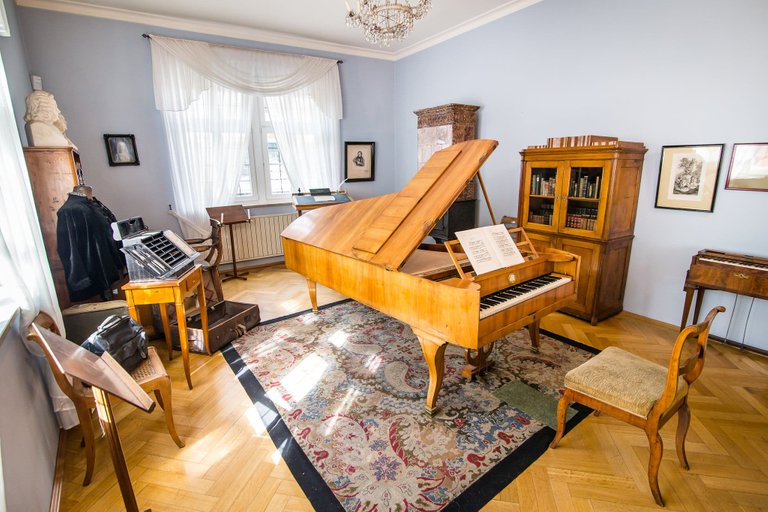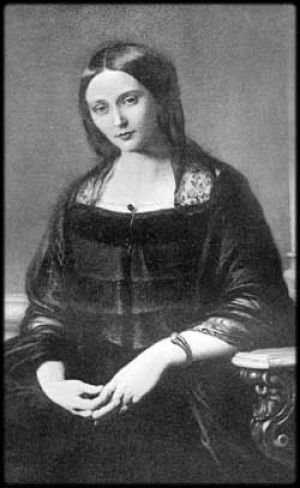
The Robert Schumann House in Zwickau
Women. Powerful and talented, who have left a significant impact in the world of music is one of the topics that has been increasingly promoted in recent years. And why not, actually. Maybe two centuries ago, it might not have been so fashionable to promote it, even though the nineteenth century was already surrounded by powerful women who fought for their rights and went against the current. Let's just look at George Sand, who not only stood out as Chopin's lover but also had her strong, own attitude. Did you know that she was wearing men's clothing without a permit? The crazy fact is that women who wanted to dress not like the other same-gender individuals had to obtain a permit to do that. Maybe Felix Mendelssohn's sister was not so lucky at her age, so she used to publish her compositions under her brother's name. Though, she refused to be just a housewife and continued to work around her compositions and music activities. We can take a closer look also to Clara Schumann, oops, Clara Wieck, born in 1819.
Clara, that girl, the woman, who stood out since she was a child, will visit the blockchain today. She was a pure musician, with a pure heart but a heart that knew how to love not only music. She was aware of her role in preserving traditional values and did not rush for fame and virtuosity, and thus gain popularity. Her first professor was her father, Friedrich Wieck, who wanted to build a career for his daughter. Clara's mother was also dedicated to music, a famous singer, and also a pianist, but she dedicated her interest to another man too, not Clara's father. She left the family, and the girl Clara was five years old at the time. A sure trauma for such a small child, especially if you continue with a father who wants you to create something like Leopold Mozart wanted from Wolfgang.
Clara had some difficulties in her childhood, apart from being left by her mother. She didnt talk until the age of 4. Although the father did not force the girl to play for many hours a day, he was strict and arrogant. If she didn't achieve everything he set out in detail and perfectionism, he was furious. Sensitive Clara lived in fear and constant dissatisfaction, and one entry in her diary reads: My father expected me to change. He told me today that I was vain, careless, unmethodical, and stubborn. He tore up the piano scores in front of my eyes and as of today he no longer wants to teach me, so I can only play scales and do boring studies.

Photograph of a painting representing Clara, by Carl Ferdinand Sohn, from 1853
When Clara was 11, two important things happened in her life. She had her first piano recital and she met someone. Robert, who started to take lessons from her father, and moved into their house (rented a room there). The two young have their phases that lasted for several years, but the love was constantly deepened by their common musical interests. Well, you can imagine, that the strict father was not very happy with that and was trying to distance them. However, it was in vain. Clara Wieck and Robert Schumann married in 1840, after many struggles to get the permit to do it.
At this moment, we can think Clara solved her problems and could become a fully free and respected musician, pianist, and composer, with her husband. But turned out that Robert was suffering from deep depressions, and she was working around the house, children, she listened to her husband's process of composing, and was the main support for them. However, she didn't want to cut herself back and continued to play and compose. A wife becomes better than the husband, who would accept that in the 19th century? Poor Robert, was more mentally sick and he was receiving friendly support from Johaness Brahms in their house. After some time, it seems that Johannes was not there just to support his friend Robert. Clara again shined, in the eyes of Brahms.
Nocturne Op.6 No.2, composed by Clara Schumann and performed by Tiffany Poon:
Robert was sick. After his suicide attempt, Johannes was visiting his friend in the hospital and lived in Schumann's family house. Maybe shocking, but it was in good intentions, not to leave family friends alone in trouble. But for sure, he was intensely in love with Clara and that led to the creation of some of the most intimate and emotional music composed during the century. He was frustrated and the constant moral dilemmas and frustration led to Brahm's creative expression.
Clara composed with all her passion too and drama is not missing from her compositions, like the one you can listen to in the next video. After Robert died, she didn't compose anymore. She dedicated the rest of her life to a pianistic career and gained international recognition. The music she played stood out for the depth and variety, as the same as her interpretations. Not a lot of pianists from her era played Beethoven's works. She did! Many was seeking virtuosity and fame. She didn't. Performing until 1891 ( she was 72 then) that is a great age already, she showed, that women can make more impact by being faithful to themselves and their beliefs, their set values. Many have proven this in history. I am so amazed by them, those with the great names we know nowadays, but with all the others too who just went unknown by the time, as maybe the circumstances didn't let them develop.
Scherzo No.2 in C Minor, composed by Clara Schumann and performed by the great Isata Kanneh-Mason:
My favorite part of the posts :) Conclusion with some questions!
I don’t know this Story but it was a great read. These are beautiful compositions.
To be sure, Clara remained faithful to Robert when he was sick, during the time b Brahm had eyes on her.
I am glad that you have read it and learned her life story. Yes, according to letters Brahms was writing to his other friend, a violinist Joseph Joachim, it remained platonic love...
Yeah.. thanks for sharing
💕
🥰🥰🥰
I had never heard of Clara Schumann but it was interesting learning about her. That's crazy that back then woman had to have a special permit to wear men's clothes! In some ways we have come a long way, but in others, not so much. Progress can be really slow at times. There are still a lot of people in the world who are oppressed in some way, unfortunately.
This is something I also wanted to touch on in the post, but couldn't manage to link it nicely so left out that part. Yes, you are absolutely right, even today so much unnecessary or nonsense laws or rules all around, and unequal treatments. What is good, that there are individuals that can be light with their example and we can focus on that ;)
Wow I didn't know this, what a story.... It got me I had to read the whole thing. I didn't know that it was difficult for women before to publish their works under their own name, good thing nowadays there is more equality and women can submit their works now, clara's story is a bit deep , strong and sad at the same time.... And that sudden love of Robert's friend towards clara is a bit uncomfortable x.x although no one rules the heart but how crazy x.x I've realized that most of us musicians at some point suffer from depression , it's like the price of being artists, creativity will lead to that? I don't understand hehe. I really enjoyed reading this , cheers @mipiano
That is cool you read the whole story, I am glad it was interesting to learn something new and also thank you for respecting the time I was writing this post, indeed. Yes, it was difficult back in time, but in some parts of the world, there is still gender inequality, even nowadays. Well, Robert was depressed before too, he had some hand injury that he tried to fix and made it even worse. At one point he had to stop playing, imagine that for a pianist!! I remember you had some health issues, you remember, so it affected your singing, I remember very well that conversation we had. Fortunately, I see your singing is back in good shape 👏
Hahaha, your observation, no one rules the heart :)) yes, though the mind should do it, if it is able to control it ;D Well, I dont know, many musicians are more sensitive, probably me included, but dont know the percentage of depressed ones. Should not be as if we are able to play, sing or compose, we should release those emotions (well true also, we can just make them even more present 😅 )
Thank you for shining light on this amazing historical figure. She is truly inspirational.
She is, and I suppose you are very familiar with her name and life :)
Yes, but there's always more to learn. I used to live in Bonn, where the Robert Schumann house is located, and where Robert's grave is located.
As a pianist and a woman, Clara has always been one of my biggest inspirations in life when it comes to music, her importance for female musicians(even the ones who don't even know who she was) is amazingly big
Nice post :)
Clara is an example and inspiration, indeed. Many times my piano teacher mentioned her, as a great personality in female pianistic history. I am glad you liked the post about her :)
Resteemed, your post will appear in the next curation post with a share for you!
Your post has been supported and upvoted from the Classical Music community (Subscribe at peakd) as it appears to be of interest to our community. We also support jazz and folk music posts!
If you enjoy our support of the #classical-music community, please consider a small upvote to help grow the support account!
You can find details about us below.
Peakd and DiscordHive Vote!
Thank you 🎶🤩